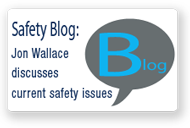Safety Articles
Five safety challenges facing the recycling industry
By W. Jon Wallace, CSP, MBA
 Recycling and environmental awareness is at an all time high in the United States as well as the rest of the World. Instead of throwing all refuse into a garbage bag for disposal to the landfill, consumers and companies are sorting out paper, plastics, and metal for recycling. Also, electronic devices such as cellular phones; computers; and televisions are being recycled to reuse precious metals as well as plastic materials. In addition, many states have enacted laws banning certain materials from being disposed in landfills in an effort to promote recycling. Recycling and environmental awareness is at an all time high in the United States as well as the rest of the World. Instead of throwing all refuse into a garbage bag for disposal to the landfill, consumers and companies are sorting out paper, plastics, and metal for recycling. Also, electronic devices such as cellular phones; computers; and televisions are being recycled to reuse precious metals as well as plastic materials. In addition, many states have enacted laws banning certain materials from being disposed in landfills in an effort to promote recycling.
Recycling is very good for the environment, however, there are significant safety challenges facing the recycling industry. Listed below are five safety challenges I have observed while consulting with the recycling industry.
- Chemical exposure: Recycling electronics components as well as metal scrap recycling typically involves separating scrap into its component metals. This may involve removing lead-containing paint, as well as separating heavy metals, precious metals, and radioactive scrap metal. These materials pose a potential health hazard to employees when they are ground/shredded, blasted, roasted, or melted and fumes or metal dusts are produced and distributed in the air. Proper work practices are needed to minimize employee exposure to these materials. Engineering control measures such as local exhaust ventilation equipped with dust collection systems are also valuable in controlling workplace and environmental exposures. In addition, periodic air sampling should be performed to verify air contaminants are below acceptable levels. Some contaminants found in this industry include: lead, cadmium, mercury, and hexavalent chromium. Noise exposure is also a concern.
- Combustible dust explosions: Recently, there have been several combustible dust explosions in the United States. Some of these explosions have involved the recycling industry. Processes that grind combustible dust such as metals and plastics may have the potential for a combustible dust explosion. Click here to learn more about what is considered a combustible dust. Recyclers with combustible dust hazards need adequate protective systems such as: spark detection; automatic suppression systems; and deflagration venting. NFPA 654: Standard for the Prevention of Fire and Dust Explosions from the Manufacturing, Processing, and Handling of Combustible Particulate Solids should be consulted for guidance.
- Machine guarding hazards: Scrap metal and paper is commonly compacted with balers to more effectively process the material. All moving parts of the baler need to be guarded to protect against employee contact. Also, all other equipment with moving parts such as rotating belts, pulleys, as well as grinders need adequate guarding to protect employees against crushing hazards.
- Lockout/tagout: As stated in recycling safety challenge #3 (machine guarding hazards), recycling involves powerful equipment with moving parts. This equipment must be routinely cleaned and serviced. It is imperative that employees do not place any part of their body into moving machinery until the equipment has been locked/tagged out. Click here to learn how to implement an effective lockout/tagout program at your facility.
- Cutting/burning: Fires and explosions routinely occur in the recycling industry due to cutting and burning of containers still containing gasoline as well as other hydrocarbons. One example involved two employees being severely burned at a recycling facility while using a metal saw to cut into old cars. Gasoline began leaking onto the ground which was ignited by the saw. To prevent against similar incidents, a hot work permit should be issued to verify all equipment has been properly purged of flammable liquids/materials and ventilated as needed. In addition, a combustible gas meter may be needed to verify the absence of flammable vapor.
Summary
This is certainly not intended as a comprehensive list of recycling safety hazards. Other hazards, such as ergonomics, and confined spaces are also prevalent in the recycling industry..
If you have any questions concerning this article or other safety issues, please contact W. Jon Wallace, "The Safety Guru", at 919.933.5548 or by
|


 Recycling and environmental awareness is at an all time high in the United States as well as the rest of the World. Instead of throwing all refuse into a garbage bag for disposal to the landfill, consumers and companies are sorting out paper, plastics, and metal for recycling. Also, electronic devices such as cellular phones; computers; and televisions are being recycled to reuse precious metals as well as plastic materials. In addition, many states have enacted laws banning certain materials from being disposed in landfills in an effort to promote recycling.
Recycling and environmental awareness is at an all time high in the United States as well as the rest of the World. Instead of throwing all refuse into a garbage bag for disposal to the landfill, consumers and companies are sorting out paper, plastics, and metal for recycling. Also, electronic devices such as cellular phones; computers; and televisions are being recycled to reuse precious metals as well as plastic materials. In addition, many states have enacted laws banning certain materials from being disposed in landfills in an effort to promote recycling.